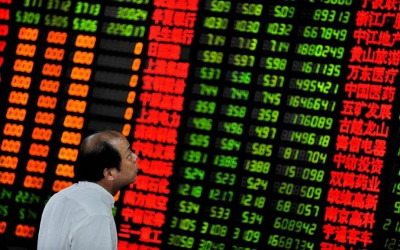AKIPRESS.COM -  Japan's economy unexpectedly shrank in the third quarter as housing and business investment declined following a tax hike, dragging the country into a recession and further clouding the outlook for the global economy, reports AP.
Japan's economy unexpectedly shrank in the third quarter as housing and business investment declined following a tax hike, dragging the country into a recession and further clouding the outlook for the global economy, reports AP.
The world's third-largest economy contracted at a 1.6 percent pace in the July-September quarter, the government said Monday, contrary to predictions it would grow after a big drop the previous quarter. The surprise deepens uncertainty when China's growth is slowing and the 18-country eurozone grew only 0.2 percent in the same quarter.
The gross domestic product figures showed across-the-board weakness in demand among consumers, manufacturers and builders. Many individuals and companies had spent money before the sales tax was hiked in April from 5 percent to 8 percent, and spending has languished since then.
"The impact of the sales tax was much more severe than expected," said Junko Nishioka, an economist at RBS Japan Securities.
Housing investment plunged 24 percent from the same quarter a year ago, while corporate capital investment sank 0.9 percent. Consumer spending, which accounts for about two-thirds of the economy, edged up just 0.4 percent.
Given the contraction, Prime Minister Shinzo Abe is expected to put off another sales tax hike planned for next October, slowing progress on efforts to rein in Japan's government debt, the largest among industrialized nations.
He also will likely make the dismal GDP reading the basis for calling a general election in mid-December to underpin the public mandate for his "Abenomics" policies of lax monetary policy, fiscal spending and structural economic reforms.
Japan emerged from its last recession just as Abe took office in December 2012, vowing to restore the nations' economic vigor after two decades of stagnation.
But the country is struggling to regain momentum as its population declines and ages. Apart from its automakers, many of its manufacturers have lost their leading edge in innovation while shifting production to cheaper locations offshore.
Household incomes, meanwhile, peaked more than a decade ago, and a growing share of workers are having difficulty making ends meet with part-time, contract work. Wage increases — mostly limited to a small share of workers in big-name companies — have lagged behind inflation.
Most economists had forecast that Japan would expand at about a 2 percent pace after a sharp 7.1 percent annual pace drop in April-June immediately following the tax hike. A recession commonly is regarded as two straight quarters of economic contraction. Compared to the previous quarter, GDP declined 0.4 percent.
While delaying the next tax hike could undermine confidence in Japan's ability to repair its battered finances, Abe and his advisers appear to view the threat to Japan's recovery as the more urgent risk.
In early 2013, Abe and Bank of Japan Gov. Haruhiko Kuroda united in seeking to end the long spell of deflation that they say is discouraging companies and consumers from spending money.
So far, price increases have fallen short of their inflation target of 2 percent, with most of the increases coming from the sales tax hike and from higher costs for imports due to extreme monetary that has helped drive the value of the Japanese yen to seven-year lows against the U.S. dollar.
